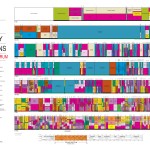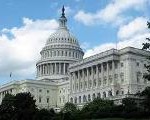 |
“Verizon Challenges FCC’s Net Neutrality Rules,” The San Jose Mercury-News, January 20, 2011. Larry was quoted in Mike Zapler’s story on Verizon’s lawsuit against the FCC’s December, 2010 Open Internet rulemaking. “It’s very vulnerable,” Downes said. |
Congress moves forward on spectrum…inventory
 I’ve written posts today for both CNET and Forbes on legislation introduced yesterday by Senators Olympia Snowe and John Kerry that would require the FCC and NTIA to complete inventories of existing spectrum allocations. These inventories were mandated by President Obama last June (after Congress failed to pass legislation), but got lost at the FCC in the net neutrality armageddon.
I’ve written posts today for both CNET and Forbes on legislation introduced yesterday by Senators Olympia Snowe and John Kerry that would require the FCC and NTIA to complete inventories of existing spectrum allocations. These inventories were mandated by President Obama last June (after Congress failed to pass legislation), but got lost at the FCC in the net neutrality armageddon.
Everyone believes that without relatively quick action to make more spectrum available, the mobile Internet could seize up. Given the White House’s showcasing of wireless as a leading source of new jobs, investment, and improved living conditions for all Americans, both Congress and President Obama, along with the FCC and just about everyone else, knows this is a crisis that must be avoided.
Indeed, the National Broadband Plan estimates conservatively that mobile users will need 300-500 mhz of new spectrum over the next 5-10 years.
The last major auction, however, conducted in 2008 for analog spectrum given up by broadcasters in the Digital TV transition, was only 62 mhz. And that process took years.
So while auctions–perhaps of more of the over-the-air allocations–could help, it can’t be the silver bullet. We’ll need creative solutions–including technology to make better use of existing allocations, spectrum sharing, release of government-held frequencies.
But why not start by figuring out who has spectrum now, and see if it’s really being put to the use that’s in the best interests of American consumers, who are ultimately the owners of the entire range.
You can guess why some people would prefer not to open that dialogue.
And perhaps why something so obvious as an inventory doesn’t already exist.
Congress Zeroes in on FCC's Net Neutrality Order
 Following up on my Congressional testimony last week, I’ve written two articles on how the House and Senate are moving forward with plans to undo the FCC’s December 23,2010 “Open Internet” order, aka net neutrality. For Forbes, I write about the experience of being a witness before the House Judiciary Committee’s Subcommittee on Intellectual Property, Competition and the Internet, and provide some background on how the FCC found itself backed into a corner that led to the unpopular (on both sides) new rules. See “Deep in the Net Neutrality Trenches.”
Following up on my Congressional testimony last week, I’ve written two articles on how the House and Senate are moving forward with plans to undo the FCC’s December 23,2010 “Open Internet” order, aka net neutrality. For Forbes, I write about the experience of being a witness before the House Judiciary Committee’s Subcommittee on Intellectual Property, Competition and the Internet, and provide some background on how the FCC found itself backed into a corner that led to the unpopular (on both sides) new rules. See “Deep in the Net Neutrality Trenches.”
On CNET this morning, I review in detail the steps taken last week by Congress. These include two hearings, one featuring all five FCC Commissioners. After the hearings, the House approved an amendment to the on-going budget negotiations that would deny the agency any funding to implement or enforce its rules. Later, both the House and Senate issued a Joint Resolution of Disapproval, which, if passed, would nullify the rulemaking and deny the FCC future authority to try again.
The conventional wisdom suggests that these are futile gestures, as President Obama would veto either measure (as well as other pending legislation on the subject). But not necessarily. Even before the new Congress came in, the President demonstrated a willingness to negotiate with Republicans (e.g., extending the Bush tax cuts). Net neutrality is certainly a priority for the White House, but it may not be as high as other priorities.
Larry to speak at two Washington, D.C. events next week
![]() Larry will be in Washington (again) next week for two events:
Larry will be in Washington (again) next week for two events:
1. March 1 – TechFreedom is sponsoring an event to review my white paper on the FCC’s December, 2010 Report and Order on the Open Internet. The event is free, but RSVP is required. Commentators include Internet pioneer Dave Farber, Free State Foundation’s Randolph May, Open Internet Coalition’s Markham Erickson, Verizon’s Link Hoewing, and Public Knowledge’s Harold Feld. Opening remarks will be delivered by Congressman Marsha Blackburn (R-Tenn.), who has introduced legislation to reverse the order and limit the FCC’s jurisdiction over Internet matters. The white paper is available here.
2. March 2 -Larry joins Richard Bennett and Randolph May at the Institute for Policy Innovation’s Third Annual Communications Summit. Other speakers include former Congressman Rick Boucher, FCC Commissioner Meredith Baker, and Andrew Keen.
Larry joins Forbes.com network
 I’m pleased to announce that I will be a regular contributor to Forbes Magazine’s high-profile website, www.forbes.com, starting immediately. Forbes is one of the most-visited websites for news and commentary on business, investing, technology and leadership.
I’m pleased to announce that I will be a regular contributor to Forbes Magazine’s high-profile website, www.forbes.com, starting immediately. Forbes is one of the most-visited websites for news and commentary on business, investing, technology and leadership.
I’ll be writing about the increasingly accident-prone intersection of business, technology, and politics, especially as it applies to the mobile Internet experience.
You can follow my posts at http://blogs.forbes.com/larrydownes/.
Please let me know if you have specific topics you’d like me to write about.
CNET/Verizon lawsuit
 |
“Verizon Loses Early Skirmish in Net Neutrality Litigation,” CNET News.com, February 3, 2011. For CNET, Larry explains why Verizon is determined to keep its net neutrality appeal in the same D.C. court that overruled the FCC in its earlier case against Comcast. |
